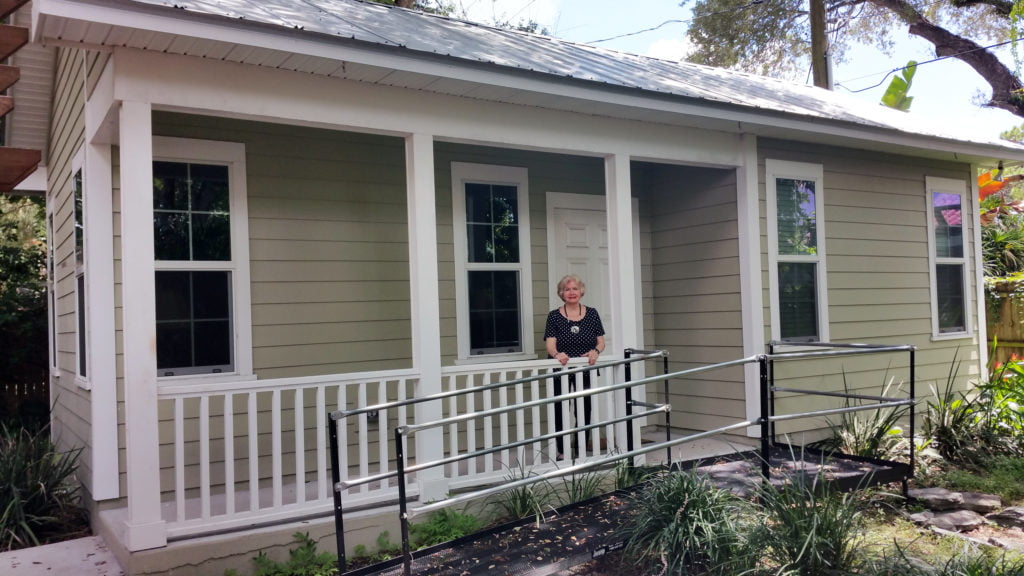
Granny Pods: Financial and Care Solution

Kathy Barker already was having concerns that her elderly father’s dementia made it increasingly difficult for him to manage his life. When his doctor said he could no longer drive, Barker had to do something.
A contractor was hired to build a 448-square-foot cottage in the backyard of her Tampa home. Her father enjoyed it for just 10 days before going into the hospital, where he died. But the house was still a great solution – this time for her mother, JoAnn George. (Her parents divorced long ago.)
Last November, George was moved into the backyard “granny pod,” which has a front porch, living room, bedroom, bathroom, and small refrigerator – but no other appliances. Granny pods, which come in a variety of architectural styles, from Victorian to modern, aren’t cheap. George’s cottage cost $90,000 to build, putting it in the higher end of the price range for these dwellings, according to Home Care Suites, which built it. [Here’s the virtual tour of the house.]
The 88-year-old George had been living in nearby Plant City, Florida, close to another daughter. But as she slowly declined, Barker decided that moving her into the backyard made sense. A flood in her mother’s home, caused by a broken pipe, provided a convenient opportunity to take matters into her own hands.
Now Barker, who runs a web development business with her husband out of their home, can keep a close eye on her mother. Although George is developing cognitive issues, she still takes care of herself, is healthy, and takes no medications.
The beauty of separate living quarters, Barker said, is that her mother can “keep [her] own independence.”
Granny pods have been around for at least 20 years but are still unusual – unless the backyard structures are viewed as just an evolution of the decades-old in-law apartment over the garage. But more granny pods are starting to pop up in this country, including in California, Hawaii, and Amish communities. They’re also gaining popularity with Australians, who call them granny flats.
Barker’s county, Hillsborough, didn’t require a zoning change to build the cottage, which is a permanent structure with a poured foundation. However, the county would bar her from renting it to a tenant in the future. That’s a fair compromise. She said that if she lived in one of Florida’s gated communities instead, she’d have “zero” chance of building one.
A few more municipalities are starting to accommodate residents’ needs for parental care. Last year, Los Angeles embraced a new California law permitting and regulating the structures as a way to ease the pressures on caregivers and on the housing market. And two years ago, Tullahoma, Tennessee passed an ordinance that allows them to be built on a caregiver’s property to house an impaired person.
Barker said that the granny pod, which is hooked up to the utilities in her main house, was a much lower-cost option than hiring home care for her mother at $10 to $12 per hour. The cottage might also postpone her mother’s move into full-time elderly care, which Barker said would cost, at a minimum, $30,000 a year. When her mother’s old house is eventually sold, the proceeds will be added to George’s savings to pay for medical or other bills.
During the interview for this article, Barker felt confident that her mother was safe, sound, and comfortable in her cozy cottage.
“She’s in her house puttering,” Barker said.
Squared Away writer Kim Blanton invites you to follow us on Twitter @SquaredAwayBC. To stay current on our blog, please join our free email list. You’ll receive just one email each week – with links to the two new posts for that week – when you sign up here.
Comments are closed.







Wow, $10-12 per hour for home care. In Seattle, that number is $22-30 per hour. And full-time care in a group setting with your own apartment/studio is $5,000/month to start, plus the cost of added services.
If interested in granny flats/pods, pay attention to the zoning laws in your town or city, long before you might need it. $90,000 for a place quite near could be a great investment. In Seattle, it would pay for itself in a couple of years. College student/grandchild later…